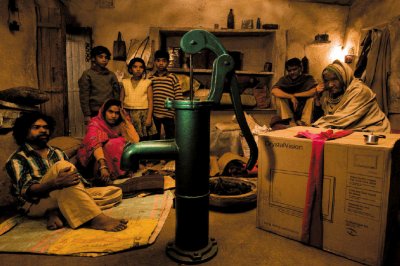Reviews - Peepli Live
Peepli Live
Reviewed By John Stakes

Peepli Live
The title to last Sunday’s film requires explanation. “Peepli” is a village in Mukhya Province, a fictitious Indian state province. “Live” is in the context of TV coverage. So why did Peepli attract our own and intense media and political interest?
The answer lies in the plot of former journalist Anusha Rizvi’s 2010 directorial debut which was India’s official entry for the 2011 Oscars. This sharp satirical comedy-drama centres on the almost impecunious Das Manik-Puri family. Natha and his elder brother Budhia are farmers but spend their paltry farming income mostly on alcohol so they cannot afford to repay a bank loan and the family is close to being evicted. Both are workshy and daily incur the wrath of their womenfolk. Natha is persuaded by his brother to make the supreme sacrifice of committing suicide so that his family can take advantage of a government compensation scheme designed to help families of deceased farmers who have killed themselves because of their debts.
As with most satirical comedies the plot thickens considerably in order to draw attention to the personal, family, political and social implications, and associated shenanigans. Natha spends the whole of the rest of the film in a state of bemused detachment as events spiral around him. Space does not permit detailed exposition save to state that everyone in the local community becomes involved including the ruling party and opposition, the local press and two competing national TV networks.
Natha is eventually kidnapped by henchmen of the ruling Samaan Party to foil his politically embarrassing suicide attempt, and held to ransom for money from the Opposition. His whereabouts are traced by local reporter Rakesh Kapoor which results in the whole community descending on the hide-out in a nearby warehouse.
In the ensuing fracas the warehouse goes up in flames, Rakesh dies and his body is mistaken for Natha. There is no payout because there was no suicide, the family loses its land and Natha moves to the city to start work as a labourer.
One of the ways of evaluating the effectiveness of any satire is to look at the extent of any criticism from any of its targets. The thrust of the satire here seems to have hit home as there has been a conspicuous absence of any serious complaint. The Nagpur-based farmers’ advocacy group apparently asked the Maharashtra provincial government to ban it because they perceived it to be insulting to the honour of the poor farmer. The only other comment came from John Travolta who thought its plot had been freely adapted from his 1997 thriller “Mad City” which most people have probably forgotten if they’d ever heard of it. This could be interpreted to mean Rizvi’s film was a damp squib which it patently was not, and the plight of the impoverished farming community (with over 185000 suicides countrywide in 4 years) was self-evident.
Rizvi had written her waspish draft screenplay back in 2004 and had intended to sell it. She later received funding to make the film herself and what an excellent professional first feature it proved to me. Her well-drawn characters plucked from a pool of theatre-based and local acting talent were expertly marshalled. In comedy-drama it is often difficult to get the balance right but here the satirical comedy was both charming and biting, and the drama was conveyed through the Rizvi’s uncompromising visual style. The colourful local farming community seemed the least concerned of anyone about their conditions and somewhat cheerfully tried to get on with their lives whilst the politicians and media pursued their own frenzied self interest around them. The film’s jaunty feel was arguably buoyed by the apparent lack of any previous suicides in this particular locality.
This was the first Indian film to be accepted in competition at the 2010 Sundance Film Festival and gained the award for best First Feature at the 2010 Durban Film Festival. The club has shown several very promising first features in recent screenings and on this showing Rizvi is clearly a name to be watched. Her film recouped its cost before its general release in August 2010 and the Keswick audience found it a thoroughly enjoyable experience.
The answer lies in the plot of former journalist Anusha Rizvi’s 2010 directorial debut which was India’s official entry for the 2011 Oscars. This sharp satirical comedy-drama centres on the almost impecunious Das Manik-Puri family. Natha and his elder brother Budhia are farmers but spend their paltry farming income mostly on alcohol so they cannot afford to repay a bank loan and the family is close to being evicted. Both are workshy and daily incur the wrath of their womenfolk. Natha is persuaded by his brother to make the supreme sacrifice of committing suicide so that his family can take advantage of a government compensation scheme designed to help families of deceased farmers who have killed themselves because of their debts.
As with most satirical comedies the plot thickens considerably in order to draw attention to the personal, family, political and social implications, and associated shenanigans. Natha spends the whole of the rest of the film in a state of bemused detachment as events spiral around him. Space does not permit detailed exposition save to state that everyone in the local community becomes involved including the ruling party and opposition, the local press and two competing national TV networks.
Natha is eventually kidnapped by henchmen of the ruling Samaan Party to foil his politically embarrassing suicide attempt, and held to ransom for money from the Opposition. His whereabouts are traced by local reporter Rakesh Kapoor which results in the whole community descending on the hide-out in a nearby warehouse.
In the ensuing fracas the warehouse goes up in flames, Rakesh dies and his body is mistaken for Natha. There is no payout because there was no suicide, the family loses its land and Natha moves to the city to start work as a labourer.
One of the ways of evaluating the effectiveness of any satire is to look at the extent of any criticism from any of its targets. The thrust of the satire here seems to have hit home as there has been a conspicuous absence of any serious complaint. The Nagpur-based farmers’ advocacy group apparently asked the Maharashtra provincial government to ban it because they perceived it to be insulting to the honour of the poor farmer. The only other comment came from John Travolta who thought its plot had been freely adapted from his 1997 thriller “Mad City” which most people have probably forgotten if they’d ever heard of it. This could be interpreted to mean Rizvi’s film was a damp squib which it patently was not, and the plight of the impoverished farming community (with over 185000 suicides countrywide in 4 years) was self-evident.
Rizvi had written her waspish draft screenplay back in 2004 and had intended to sell it. She later received funding to make the film herself and what an excellent professional first feature it proved to me. Her well-drawn characters plucked from a pool of theatre-based and local acting talent were expertly marshalled. In comedy-drama it is often difficult to get the balance right but here the satirical comedy was both charming and biting, and the drama was conveyed through the Rizvi’s uncompromising visual style. The colourful local farming community seemed the least concerned of anyone about their conditions and somewhat cheerfully tried to get on with their lives whilst the politicians and media pursued their own frenzied self interest around them. The film’s jaunty feel was arguably buoyed by the apparent lack of any previous suicides in this particular locality.
This was the first Indian film to be accepted in competition at the 2010 Sundance Film Festival and gained the award for best First Feature at the 2010 Durban Film Festival. The club has shown several very promising first features in recent screenings and on this showing Rizvi is clearly a name to be watched. Her film recouped its cost before its general release in August 2010 and the Keswick audience found it a thoroughly enjoyable experience.
Find A Film
Search over 1500 films in the Keswick Film Club archive.
Friends
KFC is friends with Caldbeck Area Film Society and Brampton Film Club and members share benefits across all organisations
Awards
Keswick Film Club won the Best New Film Society at the British Federation Of Film Societies awards in 2000.
Since then, the club has won Film Society Of The Year and awards for Best Programme four times and Best Website twice.
We have also received numerous Distinctions and Commendations in categories including marketing, programming and website.
 Talking Pictures
The KFC Newsletter
Talking Pictures
The KFC Newsletter
Links Explore the internet with Keswick Film Club


